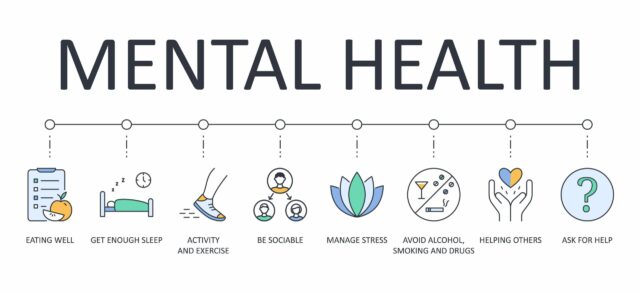
This May at Scottsdale Providence, we are continuing our focus on all things mental health. As you may have heard, it’s Mental Health Awareness Month, when annual awareness campaigns flourish and aim to reduce the stigma, educate people, and foster hope. Here, we’ll dive into one of the less expected— but super effective—treatments for mental health, and discuss the benefits of this free, easy intervention.

Exercise can benefit your mental health. Exercise is considered an antidepressant and anti anxiety treatment that improves sleep, mood, self esteem, and cognitive functioning.
How does exercise affect mental health?
-
Effective as an antidepressant for mild to moderate depression
-
Self Esteem boost and feelings of life satisfaction
-
Powerful anti-anxiety treatment
-
Better sleep, mood, and sharper cognitive functioning
While there is widespread consensus that exercise is good for you, many of us hang on to outdated beliefs that the main benefit of exercise is physical. It’s no wonder why – the benefits of movement such as lowered blood pressure, reduced risk of diabetes and cancer, and healthy aging, are well documented.
Even more of us are driven by vanity – weight loss, toned abs, or an photo-worthy physique have long been the motivation to hit the gym or lace up those running shoes.
But in recent years, we’ve cottoned on to the fact that exercise offers much more that just a fitness payoff. In fact, researchers have determined that is more effective than medication for treating anxiety and depression! Here’s how:
1. Exercise is an Antidepressant
Studies show that exercise can treat mild to moderate depression as effectively as antidepressant medication—but without the side-effects. As one example, a recent study done by the Harvard T.H. Chan School of Public Health found that running for 15 minutes a day or walking for an hour reduces the risk of major depression by 26%.
Exercise is a powerful depression antidote for a few reasons. Most crucially, it enables all kinds of changes in the brain, including neural growth, reduced inflammation, and new activity patterns that boost feelings of calm and well-being. It also releases endorphins – powerful, feel-good brain chemicals in your brain that are known for lifting the spirits.
Finally, exercise can also serve as a healthy distraction, allowing you to find some time out to break free from the cycle of negative thoughts that feed depression.This has led to “social prescriptions” from doctors such as more time outside, daily walks, and moving from a purely medical model of care to one best suited for the individual, blending physical activity, community connection, and medicine when needed.
2. Exercise Benefits Self-Esteem and Life Satisfaction
A large study from Norway showed that physically active teens in sports had higher self-esteem and life satisfaction, particularly for senior high-school girls. This also was true for university students where a clear association was found between inactivity and poor mental health, self-harm, and suicidal attempts.
Physical activity just makes you feel good. It can have a profound effect on self-esteem and body image, leading to improved mental well-being. Engaging in physical activity promotes the release of endorphins, as mentioned, which can contribute mightily to a sense of accomplishment and self-confidence. Regular exercise also helps people develop a better body image by improving physical fitness, strength, and balance.
A study published in the Journal of Sport and Exercise Psychology found that participation in a structured exercise program resulted in significant improvements in self-esteem and body image among both men and women.
3. Physical Activity Fends off Anxiety
Working out is a natural and powerful anti-anxiety treatment. It relieves tension and stress, boosts physical and mental energy, and enhances well-being through the release of endorphins. Anything that gets you moving can help, but you’ll get a bigger benefit if you pay attention instead of zoning out.
Try to bring some presence to the little details, such as the sound of your feet on the ground, the rhythm of your breathing, or the sensation of the wind on your skin. You’ll not only be in better physical shape faster by incorporating this mindfulness component into your workouts—really paying attention to your body and how it feels—but you might also be able to slow the constant chatter going through your head.
4. Better Sleep, Mood, and Mind
Physical activity, even in short bursts, is positively linked with improved sleep, a better mood and sharper cognitive function. The same endorphins that make you feel better also help you concentrate and feel mentally sharp for tasks at hand, and even short bursts of cardio in the morning or afternoon can help regulate your sleep patterns.
It’s worthwhile to note that all of these positive returns take pretty minimal effort. We aren’t talking about running marathons here. Much of the research actually suggests that shorter bursts of exercise can be more potent than endurance slogs, and that almost any amount of physical activity pays off. So what’s holding you back? For better mental health this May and beyond, get moving. Of course, we never discount the help of good doctors and therapists – get all the help you need, where you need it!
For those in crisis, help is available 24/7:
Suicide & Crisis Lifeline:
988 (call or text)
National Substance Use and Disorder Issues Referral and Treatment Hotline:
1-800-662-HELP (4357)